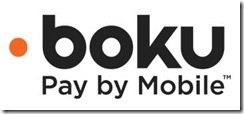In this exclusive interview with Jon Prideaux, CEO of Boku, we explore the potential impact of recent highly important mobile payments announcements on Direct Carrier Billing (DCB), which has so far been one of the most successful means of mobile payments, putting the charges through the mobile operator bill.
I posed key questions on how we may see DCB evolve, to obtain Jon’s insights, from the perspective of a FinTech disruptor that is today a world leader in DCB. Jon reflects on key trends and shares insights and expectations on how the market might evolve over the next few years.
Jon, I recently heard you speak of “payments moving into the background”. For me Boku has been one of the first to achieve this, having since 2009 offered a great way to do this, but how might this change going forward, with all the new mobile payments services recently announced?
The basic philosophy is if you are trying to promote a new method of payment, it needs to do something additional both for consumers and merchants. I believe Payments to be in the category “If it ain’t broke don’t fix it”.
Here’s why what we do works - as more people have phones than bank accounts, and it’s easier for you to remember your mobile number than other details, we remove friction in payment and allow more sales. As merchants sell more, although Boku may not be the cheapest acquiring method, we justify our role by facilitating outreach to new customers and helping customers check out more easily.
But with the impact of lower interchange rates in Europe making card payments cheaper and availability of new bank based payment solutions, are merchants going to think “It is broke”, and they can find cheaper new ways to pay?
Ours may not be the first payment option, but certainly Facebook, Spotify, Sony and our other merchants find that by adding Boku to their suite they sell more. Our merchants could see conversion rate increase by as much as 20%, and that’s the advantage we strive for, to keep ourselves relevant. If a disruptor tries to compete just on price, this fails as incumbents have scale. A disruptor must compete on “sale”.
I see Boku as a ubiquitous single convenient acquiring payment gateway or hub between merchants and mobile operators. But is Boku looking to be more than this, has this changed?
No, this has not changed. An essential part of our value is we connect into mobile operators. While Visa and MasterCard are networks that connect merchants to banks to help them sell, our job is similar, but we connect merchants to mobile operators, to help them sell.
As customers of mobile operators are different and more numerous and geographically distributed, we provide a unique value to merchants.
Where do you see this moving over the next 2 years?
Perhaps the best way to consider how things are likely to evolve is to reflect on the recent past, where I believe there have been three main areas of change.
Firstly, it’s about the technology. Telcos do not have systems as accurate as banks. What we now have in place is a system that is important in terms of creating an enabler for merchants. This facilitates charging precise amounts, authorising, reserving amounts, reconciliation, refunding and this opens up a mature enabler for new merchants.
Secondly, mobile operators differ in each market in terms of pricing expectations, Brazil, Indonesia, France, UK, Japan all differ - but in all of those markets pay-out levels to merchants are going up, allowing more merchants with lower gross margins to participate.
Lastly, it is to do with regulatory change. With our E-Money license we already have services live in 5 European markets, and this will see further expansion.
So we started with digital content where there was no distribution cost, but the pay-outs were initially not good enough for services such as music. With subsequent changes, we can now sell content from Spotify and other merchants.
As the three trends continue to further play out, in addition to digital you will see charges for real world transactions such as parking, coffee and bus tickets. This will become one of the ways to pay for ANYTHING you are purchasing – one will be card, second will be PayPal and third will be some kind of carrier billing, normally provided by Boku.
Charging to mobile phone bills will become normal in transportation, ticketing, coffee and fast foods.
With regards to the new Airbnb, Uber type FinTech entrants, what are your thoughts on your ability to support them as Braintree and others do today?
At one level we ourselves are a FinTech company. There is a limit in terms of the amount people are prepared to put on their phone bill. Our ambition is not to be the dominant payment method for all purposes.
Braintree will continue to embrace a growing suite of payment services including cards and banking. I would like to think companies like Braintree and Stripe will add carrier billing to their portfolio. We’re not far away from being a desirable addition to their ways of charging customers.
That sounds very interesting. So the whole FinTech and API trend could work in your favour!
Sure, we are offering a single API and are connected to all mobile operators. Although we make it look as if it’s the same, under the hood it works differently. In the next generation with digital technology enhancements we are trying to offer a single card like API that removes friction for merchants, and attracts more categories of merchants.
You can charge for physical goods too?
Yes, in many European countries we operate an e-money product and can do so, although the consumer experience remains similar to carrier billing. Under the hood the consumer is buying e-money and using it to buy things via their phone bill.
Is the limit that can be charged based on regulations or is it more of a policy decision?
Under the extended regulatory structure, in the e-money world it is the decision of the carrier. Mobile operators have limits in place for risk protection reasons. Also people would not want large amounts taken from their bill so this is typically a low amount. In practical terms the limits are the same whether under our e-money license or not, and are currently set to £30 in the UK.
Could you share more on your partnerships and new services?
We currently work on behalf of a number of important merchants including Spotify, Sony PlayStation across key markets in Europe, Facebook and a number of games related clients.
In terms of our plans, we’re currently working towards bring on-board a number of important and ground-breaking merchants and a number of different projects are expected to launch in the second half of this year.
In 2014 your whitepaper projected a potential market of $6b for DCB by 2017. Do you see this changing in the light of recent developments in contactless payments and mobile payments?
If anything I think the market is likely to be higher. We’re seeing increased interest from new merchants due to trends in technology, regulatory and pricing to take this to new levels.
What changes are likely over the near future, in the light the evolving role or mobile operators in payments?
There is a lot of change. Mobile operators previously launched billing to support ringtones and downloads and then Premium SMS. Both those markets are in terminal decline and so a big chunk of their revenues is shrinking. On the other hand, the direct carrier billing side is growing and we can bill without sending SMS around.
What about services such as Samsung Pay, Apple Pay, Android Pay and others? We also see the various new Checkout services. I can visualise each catering to a sphere of their interest – so for instance Samsung could turn their focus to TV-related payments. Is this a concern for you?
Is it of concern - No, although I agree this is a particularly historic period of change, and these are all significant developments. In the UK context, and indeed across Europe there is a lot of interest in innovation and contactless payments is exploding across the region. These services are however largely reliant on bank-based initiatives and banked customers. Our service is meant for those who do not have a bank account, or who want to buy and charge to a bill. Who will co-operate, who will compete remains to be seen. We could be a source of funds across a number of the emerging services, to sell more stuff through this charging mechanism.
I expect that in the face of rapidly increasing fragmentation, you could represent a source of stability for consumers and merchants?
Sure, we certainly hope so. Most of the time it may not be a Boku logo but a picture of a phone, and it’s so easy for people to visualise how the payment works.
We spoke about some of the opportunities, but how about the risks for mobile operator initiatives, as a number of ambitions towards payments have failed?
Yes, it’s hard to find a mobile operator joint venture that’s worked. The fact is banks are well entrenched and it’s been hard for MNOs to compete. Mobile operators have certain core assets in terms of the infrastructure, but they have a bigger massive advantage in terms of customer base. Enabling existing customers to pay using the bill is something that really works for our mobile operator partners.
In terms of risks, a key concern could be in terms of regulation. Mobile operators don’t want further regulation as there is already a great deal from telecom regulators. Voluntarily assuming new forms of regulation is tough and that’s where we come in, to help monetise existing customer relationships to help to manage that area for them.
What do you think about proposed API access to bank accounts, new digital banks?
This is about opening up to more competition and I see this to be a welcome move from the regulator. However as far as Boku is concerned we are here to provide merchants access new customers, not really banked adults, so we stick to our task and make what we uniquely do successful.
How is the UK market different to the rest of Europe, especially in the light of recent moves towards mobile payments and also the focus on FinTech?
UK is an interesting and highly competitive market. There are more enlightened, progressive mobile network operators. Merchants have more options than they could want, comparative to rest of Europe. Germans prefer debit cards, French may use cheques a lot, and each European market has its own characteristics.
Jon, this has been very interesting. Thanks very much for your time today and wish you the very best for the future.
Jon Prideaux is CEO of Boku, a company that has since 2009 created the standard for online payments using your mobile phone, making it easy to pay for digital goods and social experiences across the web.
Jon Prideaux has a wealth of knowledge of how we pay, having held key roles at Visa and helped in the migration to Chip and PIN, when on the Executive Committee of EMVCo.
Charmaine Oak is Author of The Digital Money Game and co-author of Virtual Currencies – From Secrecy to Safety
Join me on Twitter @ShiftThoughtDM and The Digital Money Group on LinkedIn



